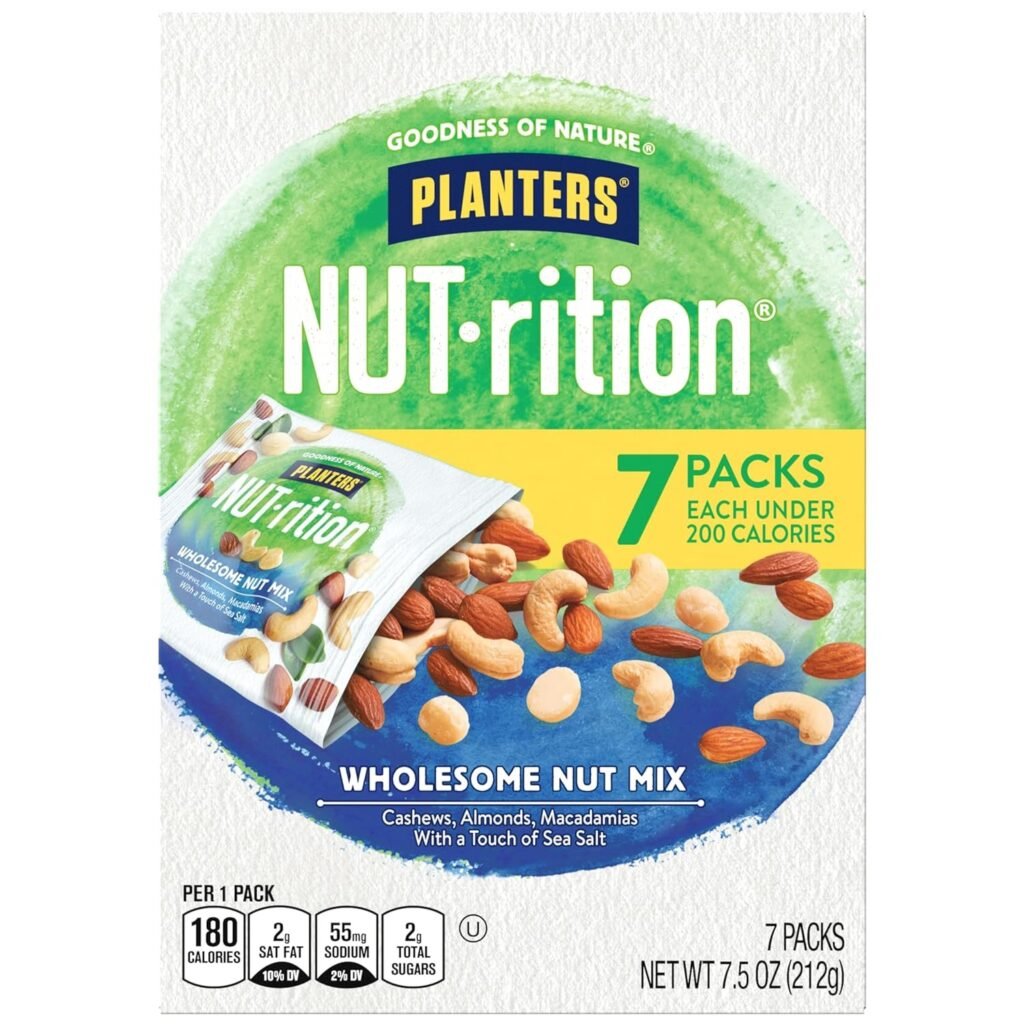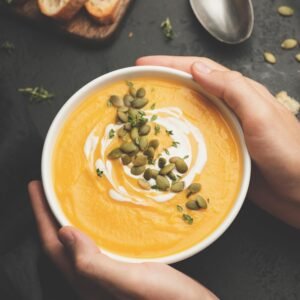Conquer inconsistent eating patterns with strategies for smart snacking on unhealthy food—transform habits into healthy snacks choices for well-being.
How To Break Unhealthy Snack Habits: Snack Smart for Health
Understanding how snacks fit into a balanced diet is key to eating well. Adding more fruits and leafy greens can boost health. But, unhealthy snacking can undo these gains, raising the risk of strokes and heart disease.
Studies show most people snack two to three times a day, often choosing sweets or crisps. This can harm blood sugar and fat levels. Experts suggest healthier options like fruits or raw veggies for snacks.
Getting ready for healthy snacking is important. Preparing snacks ahead helps avoid sugar swings and weight gain. Making your own snacks helps dodge harmful additives found in vending machine foods.

PLANTERS NUT-rition Wholesome Nut Mix, Mixed Nuts with Cashews, Almonds and Macadamia Nuts, Flavored with Sea Salt, Plant-Based Protein, Individual Nut Packs, After School Snack, 7.5oz (7 Count)
Snacking late at night can hurt your heart health, even with healthy choices. Smart snacking is essential. Trying different fasting or eating patterns can improve health and energy.
Key Takeaways
- Understanding the role of snacking is crucial for healthful eating.
- Most people consume two to three snacks daily, often choosing unhealthy options.
- Preparing nutrient-dense snacks ahead of time can prevent unhealthy eating patterns.
- Late-night snacking affects cardiometabolic health, highlighting the need for informed snacking solutions.
- Intermittent fasting and time-restricted eating can enhance health and energy.
The Impact of Inconsistent Eating Patterns on Health
Inconsistent eating habits mean eating at random times and skipping meals. These habits can lead to weight gain, stomach problems, and a higher risk of chronic diseases. It’s important to know how these habits affect your health to improve your eating habits and well-being.
Understanding Inconsistent Eating
Snacking without being hungry often comes from emotional eating. These snacks are usually full of sugar and fat. Eating close to bedtime can make you gain weight, raise blood pressure, and increase the risk of heart disease.
About 90% of U.S. adults snack on any given day, making up 20% of their daily energy intake. Snacking can help meet nutrient needs or lead to obesity if eaten too much.
Skipping meals can make you feel tired, unfocused, dizzy, and irritable. This might lead to eating too much or craving unhealthy foods. Stress eating can also make you eat more processed foods, raising the risk of diseases like diabetes or heart disease.
Effects on Overall Well-Being
Eating too quickly can cause overeating, indigestion, heartburn, and weight gain. Snacking has increased in the U.S., which can lower diet quality if unhealthy choices are made. This is bad news for those with diet-related chronic diseases, affecting 60% of U.S. adults.
Irregular eating is linked to a higher risk of metabolic syndrome in adults. But, nutrient-rich snacks are part of the U.S. Dietary Guidelines to help maintain a healthy weight and lower disease risk. Regular meals can improve insulin sensitivity and lipid profiles, helping with metabolism, especially in healthy women.
Adding whole foods like beans, whole grains, and fresh produce to your diet can prevent hunger and keep you full longer. This helps maintain a balanced diet for better health.
Knowing these effects can help you improve your eating habits for better health. Setting regular meal times and choosing balanced snacks can reduce the negative effects of snacking and support a healthier lifestyle.
Identifying Triggers of Emotional Eating
Understanding what makes you eat when you’re not hungry is key to stopping this habit. Knowing what triggers your emotional eating can help you manage cravings and find better ways to deal with stress.
Common Emotional Eating Triggers
Feeling stressed, bored, lonely, or tired often leads to eating unhealthy snacks. Stress, being tired, money worries, and health issues are big reasons people eat emotionally. Stress can make you crave bad foods because of a hormone called cortisol. Some people eat to cope, which can lead to binge eating. Being with friends or family can also make you eat too much. Knowing what triggers your emotional eating is the first step to stop it.
Strategies to Combat Emotional Eating
Eating mindfully can really help you deal with emotional eating. Eating slowly, enjoying each bite, and controlling how much you eat can stop binge eating. Keeping track of what you eat and how you feel can show you patterns that help you tackle your emotional eating. Having people you can talk to can also help you avoid emotional eating.
Choosing healthy snacks like fruits, veggies with low-fat dip, nuts, or unbuttered popcorn can curb cravings. Eating regular meals with healthy foods can reduce cravings from emotional stress. Finding other ways to meet your emotional needs, like talking to a therapist or taking care of yourself, can break the cycle of emotional eating. If you can’t manage it on your own, seeing a therapist is a good idea.
Good ways to fight emotional eating focus on finding out why you do it and eating better. Using these tips can give you more control over your eating and improve your health.
Recognizing and Managing Food Cravings
Understanding food urges is key to eating healthier. The snack food industry spends over $10 billion a year on ads. These ads push for sugary, salty, and fatty snacks. About half of people often feel the urge for snacks, making it hard to stop. Stress and lack of sleep also play a big part by messing with our hormones and brain signals.
To fight cravings, eating more protein helps a lot. Men who eat 25% of their calories from protein see a 60% drop in cravings. Not sleeping well makes you more likely to gain weight. Having healthy snacks ready can help you stay on track and resist junk food.
Eating foods high in fiber, like spinach, can cut cravings for unhealthy foods by 87-95% in overweight women. Using health messages and social norms can also help young adults eat fewer high-calorie snacks.
Exercise is great for controlling snack urges. It changes hormones that control hunger. It lowers ghrelin and raises leptin and glucagon-like peptide based on how hard and long you work out. Knowing how hormones change in women during their cycle can also help understand cravings better.
Snack food ads target kids a lot, leading to more calories and a love for unhealthy foods. This helps parents set strong rules to stop kids from snacking too much. Using firm parenting can cut down on high-calorie snacks.
Mindful eating is good for eating better. It cuts down binge eating from four to 1.5 times a week in six weeks. Making healthy food choices and planning meals well are key to fighting cravings.
| Strategy | Reduction in Cravings | Source |
|---|---|---|
| Increased Protein Intake | 60% in Overweight Men | |
| Spinach Extract | 87-95% in Overweight Women | |
| Mindful Eating | Reduction from 4 to 1.5 Binge Episodes per Week | |
| Exercise | Lowers Ghrelin, Increases Leptin and Peptide |
From Mindless Eating to Mindful Snacking
Mindless eating often leads to eating too much and disconnects us from the act of eating. To switch to mindful snacking, focus on the act of eating, stay in the moment, and listen to your body’s signals of fullness.
Principles of Mindful Eating
Mindful eating means knowing where your food comes from, using your senses, and enjoying each bite. Over 90% of Americans snack one to three times a day. Being mindful can help control snacking and stop addictive eating in 44% of adults aged 50 to 80 who struggle with it. By knowing your food’s origin and savoring each bite, you connect better with your hunger and fullness signals.
Techniques to Implement Mindful Snacking
To start mindful eating, turn off the TV and other distractions that lead to mindless snacking. Also, measure your food to avoid eating straight from a bag, which can lead to eating too much. A study found that a mindfulness program helped overweight or obese women eat less when craving and lose weight. Keeping a food diary can also make you more aware of your snacking habits.
Practicing mindful eating helps with portion control and encourages eating on purpose. Snacks make up to 22.4% of our daily calories, so these strategies are key for a balanced diet. Eating slowly, enjoying each bite, and focusing on flavors can make you feel more satisfied and eat less.
Portion Control: Eating Just Enough
Controlling how much you eat is key to a healthy diet. It helps avoid eating too much and keeps meals balanced. By managing how much you eat, you can help control your weight.
Tips for Proper Portion Sizes
Here are some easy steps to manage your portions. Use smaller plates to eat less and avoid filling your plate too much. When eating out, share your meal or take some home to keep portions in check. Follow dietary guidelines, like the American Heart Association’s advice on sugar intake. Snacking every 3-4 hours can also help balance your blood sugar and prevent overeating.
Benefits of Practicing Portion Control
Managing your portions does more than just stop overeating. It helps with digestion and keeps your metabolism healthy, which is good for your overall health. Eating balanced meals means you get the nutrients you need and eat less sodium, fat, and sugar. Healthy snacks like Greek yogurt with berries or mixed nuts can also help you stay on track with your diet goals.
Choosing whole foods over processed snacks is important. Pick foods like Greek yogurt, apple slices, and nut butter for a balanced diet. Eating these foods keeps you well-nourished and gives you energy all day.
Using these tips helps with weight control and builds a healthier relationship with food. Pay attention to how much you eat and choose foods rich in nutrients. This leads to a more balanced and satisfying way of eating.
Meal Planning for Smart Snacking
Planning your snacks can change how you eat for the better. It helps manage hunger, stops overeating, and keeps your blood sugar stable. This is great for people with diabetes. Having healthy snacks ready means you won’t grab unhealthy ones when you’re hungry.
There are many healthy snack options to choose from. The 2020-2025 Dietary Guidelines suggest snacks like raw veggies, fresh fruit, nuts, and whole grains. These snacks keep you full and are good for your health. Try to pick snacks that are filling and full of nutrients.
Smart snacking is also about planning your eating times. Planning meals helps you control snack sizes, keeping them between 200-300 calories. This helps with weight control and boosts metabolism by eating five healthy snacks a day. Talking to health experts can help make a snack plan that fits your health goals.
Planning snacks helps you eat healthier every day. Teens who ate healthy snacks and got enough sleep ate better overall. Making snacks with the right ingredients and sizes helps you avoid bad choices like vending machine snacks. Healthy snacks like eggs, nuts, Greek yogurt, hummus with veggies, and dark chocolate are good for you.
The Importance of Nutrition Education
Knowing about nutrition and the value of food is key to making smart snack choices. Nutrition education helps people understand the good and bad in different foods. It also teaches them about the effects of eating certain foods, making them more food literate.
Studies show that people make better snack choices after learning about nutrition
Learning about food literacy helps people pick snacks that are full of nutrients and avoid those high in fats, sugars, and sodium. A study found that young kids chose healthier snacks after learning about nutrition. Also, adding certain fibers like yellow pea fiber to diets can help with weight control and gut health.
With nutrition education, people can pick snacks that fit their health goals. Programs for low-income families can give them access to healthier foods, helping to reduce health gaps. Knowing about programs like The Gus Schumacher Nutrition Incentive Program and CDC Food Service Guidelines helps in making better snack choices. This knowledge lets people make healthier choices and improve their well-being.
Transforming Inconsistent Eating Patterns with Healthy Snacks
Creating a consistent eating routine is crucial for good health. Eating healthy snacks can help a lot with this. Snacking has become more common in the US, from 1977 to 2006. Choosing healthier snacks can help control energy levels and prevent overeating.
Examples of Healthy Snacks
Looking for healthy snack options? Try raw veggies like carrots and bell peppers, fresh fruits like apples and berries, nuts such as almonds and walnuts, plain yogurt, whole grains, and legumes. These foods are full of vitamins, minerals, and fiber. They help keep energy up without the extra calories from processed snacks. Since snacks make up a big part of kids’ daily calories, choosing these snacks can help them develop good eating habits for life.
Benefits of Nutrient-Dense Foods
Eating nutritious snacks has many benefits. These foods help with weight control, improve metabolic health, and boost the immune system. Drinks with lots of calories can add a lot to your daily energy intake, especially for overweight women. The CDC suggests eating less sodium, which is different from what most Americans do. Choosing healthier snacks can lead to better health and a balanced diet.
FAQ
What are some effective ways to snack smart for better health?
Snacking smart means picking healthy options like fruits, veggies, and snacks with protein. Stay away from unhealthy snacks. Plan your snacks ahead with homemade choices. Focus on foods packed with nutrients to keep your diet balanced and fight bad eating habits.
How can inconsistent eating patterns affect my health?
Inconsistent eating can hurt your health by leading to overeating and poor nutrition. It can also mess with your energy levels. Eating at regular times and choosing balanced snacks can make you feel better overall.
What are common triggers of emotional eating, and how can I manage them?
Emotional eating often comes from stress, boredom, tiredness, or sadness. Know your triggers and try mindful eating, control your portions, and pick healthier snacks to fight emotional eating and stop binge eating.
How can I recognize and manage food cravings?
Understanding hunger and knowing the difference between hunger and craving comfort foods is key. Eating satisfying meals and keeping healthy snacks ready can help you resist cravings and stay on a healthy diet.
What are the principles of mindful eating?
Mindful eating means eating with full attention and noticing when you’re hungry or full. Eating without distractions and enjoying the taste and texture of your food can improve your eating habits and stop mindless eating.
How can portion control benefit my health?
Controlling your portions prevents overeating and helps with weight management. Use smaller plates, share meals when eating out, and stick to recommended sizes. This leads to better digestion, metabolic health, and balanced nutrition.
Why is meal planning important for smart snacking?
Meal planning helps you have healthy snacks ready, avoiding bad impulse eating. Making snacks ahead lets you control what goes into them, leading to a balanced diet and steady energy all day.
Why is nutrition education crucial for making informed dietary choices?
Learning about nutrition helps you know the good and bad in foods, their effects on your body, and how to read labels. This knowledge helps you choose better snacks and know the difference between healthy and unhealthy foods.
What are some examples of healthy snacks to incorporate into a consistent eating routine?
Healthy snacks are things like raw veggies, fresh fruits, nuts, plain yogurt, whole grains, and legumes. These snacks are full of vitamins, minerals, and fiber. They help with weight control and health, and keep you from getting hungry.
What are the benefits of consuming nutrient-dense foods as snacks?
Eating nutrient-dense snacks gives you important vitamins, minerals, and fiber without too many calories. These snacks support weight control, boost metabolic health, and strengthen your immune system. They make your diet nourishing and balanced.
Source Links
- https://www.telegraph.co.uk/health-fitness/diet/nutrition/how-to-stop-snacking-healthy-eating-habits-diet-nutrition/
- https://eatbobos.com/blogs/health-nutrition/what-is-a-healthy-snack
- https://health.ucdavis.edu/blog/good-food/bad-eating-habits-when-what-and-how-often-you-eat-matters/2023/06
- https://www.ncbi.nlm.nih.gov/pmc/articles/PMC10097271/
- https://www.cambridge.org/core/journals/proceedings-of-the-nutrition-society/article/meal-irregularity-and-cardiometabolic-consequences-results-from-observational-and-intervention-studies/1969DB83C64B09E221A4B8929B7D8A8C
- https://www.helpguide.org/articles/diets/emotional-eating.htm
- https://www.mayoclinic.org/healthy-lifestyle/weight-loss/in-depth/weight-loss/art-20047342
- https://nutritionsource.hsph.harvard.edu/cravings/
- https://www.healthline.com/nutrition/11-ways-to-stop-food-cravings
- https://www.ncbi.nlm.nih.gov/pmc/articles/PMC5015032/
- https://www.forbes.com/sites/lanabandoim/2023/12/20/snacking-epidemic-new-research-on-americas-obsession-with-snacks/
- https://www.nchpad.org/1693/6799/Mindful~vs~~Mindless~Eating
- https://www.washingtonpost.com/wellness/2024/02/06/mindful-eating-cravings-hunger/
- https://healthystepsnutrition.com/snacking-and-eating-a-balanced-healthy-diet/
- https://www.healthline.com/nutrition/29-healthy-snacks-for-weight-loss
- https://www.mutualofomaha.com/advice/live-a-better-healthier-life/smart-snacking-healthy-options-to-keep-you-satisfied
- https://www.stlukeshealth.org/resources/get-smart-about-snacking-with-these-6-tips
- https://www.ncbi.nlm.nih.gov/pmc/articles/PMC8155224/
- https://digitalcommons.lib.uconn.edu/cgi/viewcontent.cgi?article=1678&context=gs_theses
- https://www.cambridge.org/core/journals/public-health-nutrition/article/snack-frequency-associations-with-healthy-and-unhealthy-food-choices/888B1F635485431C612DE19B4BC9442D
- https://health.gov/healthypeople/priority-areas/social-determinants-health/literature-summaries/access-foods-support-healthy-dietary-patterns
- https://www.ncbi.nlm.nih.gov/pmc/articles/PMC6141992/
- https://www.ncbi.nlm.nih.gov/pmc/articles/PMC6854314/
- https://advancedbodyscan.com/how-your-eating-habits-affect-your-health-how-to-change-them/







